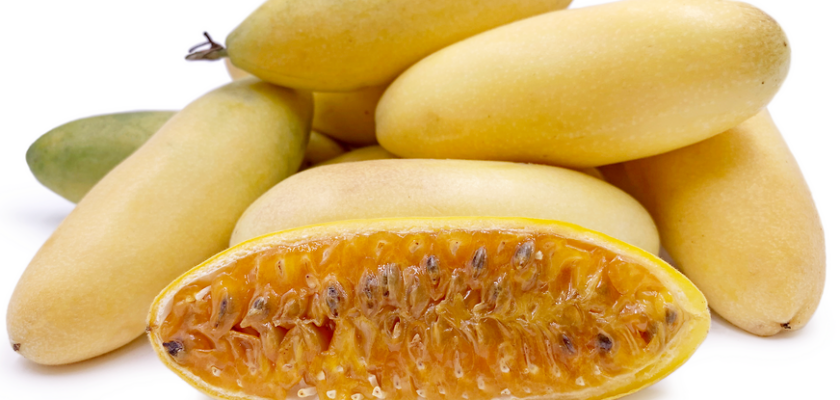Banana passionfruit, scientifically known as Passiflora tripartita, is a tropical and unique fruit cherished for its sweet and aromatic flavor. When purchasing banana passionfruit, it’s essential to select fruits that are ripe and of high quality to fully appreciate their distinctive taste. This buyer’s guide provides valuable tips to help you make informed choices when buying banana passionfruit.
- Appearance:
a. Size: Banana passionfruits are larger than regular passionfruits and can reach lengths of up to 6 inches. Opt for fruits that are sizeable, as they are more likely to be fully ripened and packed with flavor.
b. Color: Ripe banana passionfruits typically have a bright yellow or orange skin. Avoid fruits with a predominantly green or overly wrinkled skin, as they may not be ripe.
c. Texture: The skin should have a slightly wrinkled appearance, indicating ripeness. However, avoid fruits with excessive wrinkles or soft spots, as they may be over-ripe or spoiled. - Weight: When you hold a banana passionfruit, it should feel heavy for its size. A heavier fruit is usually juicier and riper.
- Fragrance: Ripe banana passionfruits emit a sweet, tropical aroma. Gently squeeze the fruit near your nose and select fruits with a fragrant smell.
- Firmness: Apply light pressure to the fruit with your fingers; it should yield slightly without being overly soft. Avoid passionfruits that are rock hard or excessively mushy.
- Wrinkles: Ripe banana passionfruit should have some wrinkles on the skin. Nevertheless, avoid fruits with excessive wrinkling, as it may indicate over-ripeness or dehydration.
- Check the Stem: Examine the stem or cap of the fruit. It should be intact and not shriveled or moldy. An intact stem indicates freshness.
- Quantity: If you plan to use banana passionfruit regularly, consider buying them in bulk when they are in season. You can scoop out the pulp, freeze it, and enjoy it year-round.
- Organic and Local Options: Whenever possible, choose organic banana passionfruit to minimize exposure to pesticides. Supporting local farmers or markets may yield fresher and more flavorful passionfruit since they are often picked closer to ripeness.
- Storage: Store ripe banana passionfruits in the refrigerator to prolong their shelf life. They can last for up to two weeks when stored properly.
- Usage: Banana passionfruit can be enjoyed by scooping out the pulp and consuming it directly or using it as a topping for desserts, yogurt, or smoothies. Some recipes call for using the entire fruit, including the seeds, for added texture and flavor.
- Ripening at Home: If you purchase slightly underripe banana passionfruit, leave them at room temperature until they soften and develop wrinkles. This process may take a few days.
Keep in mind that banana passionfruit is a highly perishable fruit, so it’s important to use or consume it promptly once it’s ripe. By following these guidelines, you can select the finest banana passionfruit for your culinary adventures and savor their unique flavor to the fullest.
